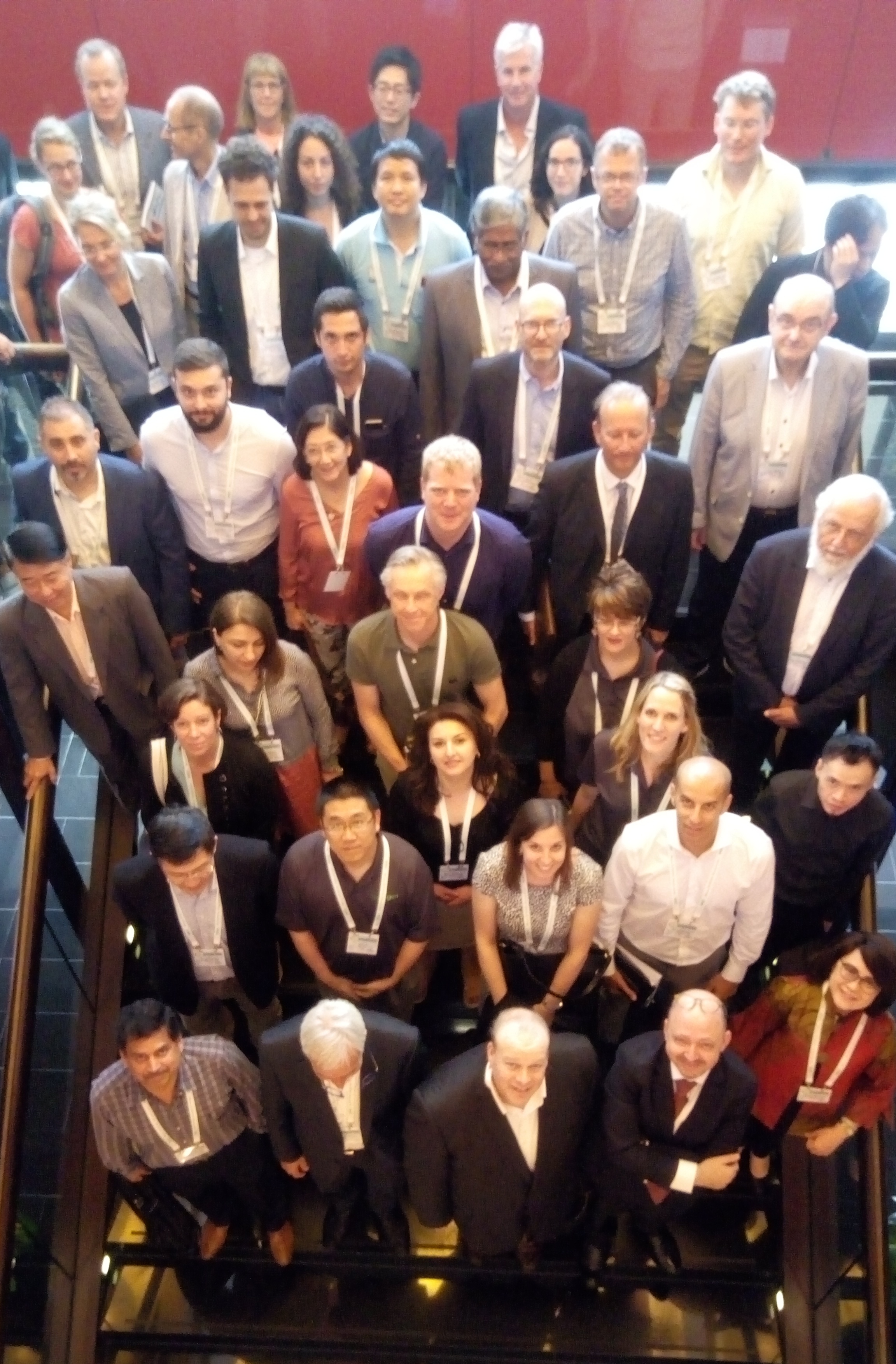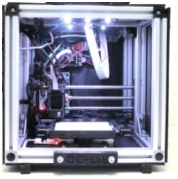News 2018
Jubilee
Their life's work and influence (for me, it is mainly Professor Jork and Dr. Jänchen) are our obligation. They have passed away, but their scientific legacy lives on. In 1991, I met first and then many times more Professor Kraus, Professor Funk, Dr. Burger, and Professor Nyiredy during the many GDCh courses held in the institute of Professor Jork, in which also I had to make my presentations besides the well-known scientists.
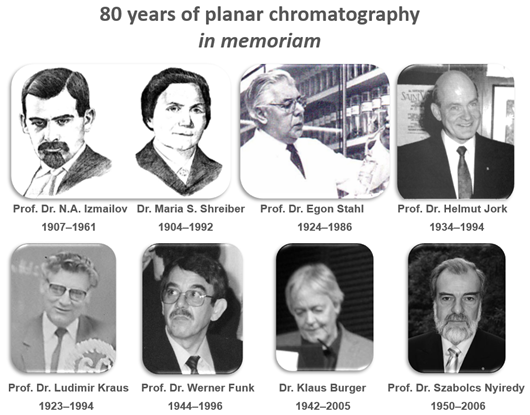
Guests on earth
Dieter was not only a company founder and stringent boss, but above all a scientist, being chemist with a PhD. He dedicated his life's work to the development of HPTLC instruments. He also loved his hobby, flying, be it gliding, powered flight or aerobatics. We met 25 years ago. Right after my 1993-lecture in Ulm on planar chromatography in water analysis, he came up to me and asked, "What are you going to do when you finish?" Since I had only started my PhD, I responded his question was too progressive. At the next meeting he asked the same question, so I countered that my boyfriend lived in Frankfurt and that I would probably apply to the nearby company Merck at some point. After another lecture in 1994 in Düsseldorf (19 lectures held during my PhD), he asked me the same question for the third time. This time, I recognized his intention, smiled and said what he wanted to hear: well, maybe I will go with CAMAG. This was a typical example how he challenged our minds. With him one could reflect excellently and occasionally also collect goals like in a soccer match. Here an institutional orbituary. He will always be remembered great, poient and edgy, to me especially as a great fatherly and treasured scientific partner.

HPTLC 2018 in Bangkok
With the aspirations of involving more researchers from Asia and expanding the HPTLC network, the 24th international symposium HPTLC Asia 2018 was organized in Bangkok, Thailand (27.-30.11.2018) - for the first time in Asia!
Opening by Prof. Dr. Wanchai DeEknamkul and me
Award ceremony: Dr. Yam, Malaysia (Xie Pheisan Award for the Young Researcher) as well as Poster Prize Awardees Yugandhara Patil, India, Laksana Charoenchai, Thailand and Alan Bergmann, Switzerland (in between Prof. Dr. Morlock and Mr. Bernard-Savary)
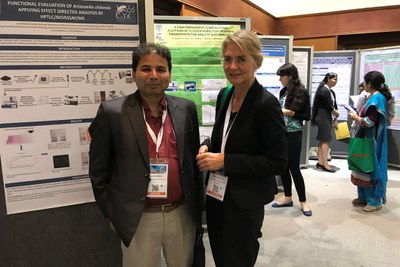
Dr. Sayeed Ahmad, Jamia Hamdard University, Delhi, India
Students' view on our faculty
A 5 min video made by students reflects on what they think is special at the Faculty of Agricultural Sciences, Nutritional Sciences, and Environmental Management. Our Food Science Laboratory is seen for 6 seconds (3:35-3:38 and 3:59-4:02). Hurraih!
Award for research in hyphenated HPTLC
Dr. Imanuel Yüce was nominated for the Merck Life Science Food & Beverage Safety Award. In the worldwide competition, the best 4 candidates were invited to hold a lecture at the Innovation Center in Darmstadt on 23.10.2018 (I. Yüce, G. Morlock: Development of in situ and in silico structure elucidation tools in planar chromatography).
Faculty prize
The prize of the Faculty 09, donated by the Förderkreis Agrarwissenschaften, Ökotrophologie und Umweltmanagement Gießen e.V., for an excellent doctorial thesis was granted to Dr. Dimitri Fichou by the Dean Prof. Dr. Eder und Prof. em. Dr. Leonhäuser, Förderkreis Board Member.
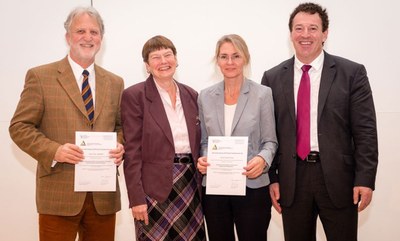
Prof. Dr. Kühl, Prof. em. Dr. Leonhäuser, Prof. Dr. Morlock (in place of Dr. Fichou, absent) and Dean Prof. Dr. Eder (Foto: Friese)
Excellent lecture on writing scientific papers
Prof. em. Dr. Rob Verpoorte, Leiden University, The Netherlands, reported on how to write a world-class scientific paper. In his function as editor of scientific journals, he dealt with ca. 40000 manuscripts and has a broad experience in the outline of papers. Being first of all a profound scientist, then a distinguished editor, but also a charming dedicated teacher… altogether, this made it so impressive and lasting in the effect. Thank you for being with us! About 70 attendees learned a lot and the discussion showed that there is need to do it better! Greatest thanks to Rob!

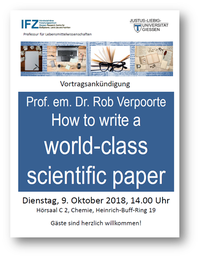
Interuniversitary serving
Hosting guest researchers
Each year too many requests for joining our group to learn hyphenated HPTLC... We try our best and in 2018, we hosted and still host several guest researchers. They brushed up their knowledge and worked on different samples that are of importance for the benefit of their home countries.
- Dr. Angel Ernesto Bañuelos-Hernández (Depto de Ciencias de la Salud, UAM, Iztapalapa) from Mexico working on Plectranthus coleoides (P. galbatrus) extracts
- Ehab Mahrane (Al-Azhar University, Cairo, and Philipps University of Marburg) from Egypt working on Primula boveana extracts
- Vesna Vasić and Djurdja Krstić (Innovation Centre of the Faculty of Chemistry and Faculty of Chemistry, Department of Analytical Chemistry, University of Belgrade) from Serbia working on food falsification (apricots, peaches, grapes, apples and pumkins to mention few). They made a very good job as food detectives. Looking foward to Dr. Petar Ristivojevic who will join next in the DAAD project on food adulteration.
- Ibukun O. Ibadan Ayoola (International Institute of Tropical Agriculture, Ibadan) from Nigeria working on Musa acuminata leave extracts
- Dr. Vandana T. Gawande (Department of Pharmaceutical Chemistry, Sinhgad Institute of Pharmacy, Pune) from India working on Ficus religiosa leave extracts
- Joyce Chepngeno (Department of Food Science and Technology, Jomo Kenyatta University of Agriculture and Technology, Nairobi) from Kenia working on baobab leave extracts
- Jeton Spahiu (Faculty of Agriculture and Veterinary, University of Prishtina) from Kosovo working on ochratoxin A in coffee samples available on the market in Kosovo
-
N. G. Aruna Shanthagas Sumudu Chandana (Institute of Science, University of Peradeniya, now student at JLU) from Sri Lanka working on cinnamom bark sample extracts from Sri Lanka
-
Hannelore Borck (Fachbereich OE, Hochschule Fulda) in cooperation with Abera Belay (Center for Food Science and Nutrition, Addis Ababa University) from Ethiopia working on Ethiopian honey samples


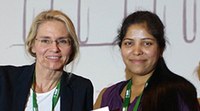
Djurdja Krstić and Vesna Vasić Ibukun Ayoola Dr. Vandana Gawande
Translation
Within a running project, there was a 4-day translation course in July. For inspiration after a heavy learning day, together in the Liebig museum in the evening, learning how Justus Liebig worked at that times... Professor em. Dr. Kröger made an impressive tour for scientists of seven nations, reviving the heritage of the ancient leader in chemistry. Thank you so much!
Student started his tomato business
Update: Two years later the tomato business is online: maintomatenglueck.de! Great to see the success with the organic production of delicious tomatoes and tasty products. Congratulations! A perfect snack and the products made of such tasty raw materials are outstanding. In the video you feel the hard work and passion...
A talk on fire
At the 8th World Convention on Stevia (WSO) in Berlin on June 4th, the presentation given on steviol glycosides and (iso)steviol in Stevia products was awarded by the Father of Stevia Award 2018. The father of Stevia, Mr. James May, brought the Stevia plant to USA almost 4 decades ago. His son Dr. Michael May awarded this prize.
Moderating the Live Lab Food Analysis at Analytica
Analytica 2018 counted 35.800 visitors and 1.164 exhibitors from 49 countries. Again, the Live Lab Food Analysis was moderated on May, 12th. At each 1-hour interview round, ten selected manufacturers showed a food experiment with top instrumentation from sample preparation to high sophisticated methods. See also the last one in 2016...
Assembly instruction for Office Chromatography Lab
The assembly of the Office Chromatography Lab by PhD Student Dimitri Fichou is shown in a video, in supplement to a recent paper (Fichou, D., Morlock, G.E.: Office Chromatography: Miniaturized all-in-one open-source system for planar chromatography, Anal. Chem. 90, 2018, 12647–12654). Open-source developments are similar to radical chain reactions, exponential in progress and highly dynamic in its outcome. So it is in many aspects an interesting experiment worth to contribute!










